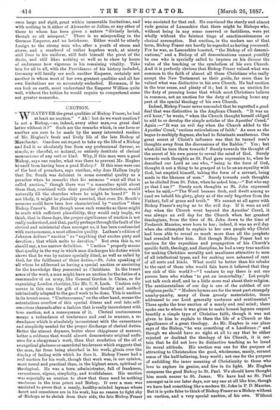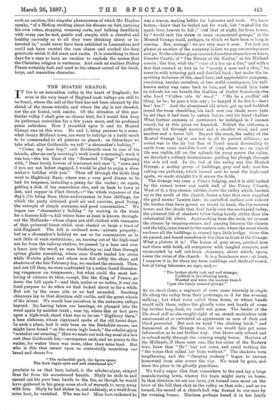UNCTION.
" WHATEVER the great qualities of Bishop Fraser, he had at least no unction." " Ah ! but do we want unction P Is not a Bishop,—as, indeed, every other man,—a great deal better without it ?" Such are the remarks which, in one form or another are sure to be made by the many interested readers of Mr. Hughes's fresh and lively life of the late Bishop of Manchester. One does not expect to take up the life of a Bishop and find it so absolutely free from any professional flavour, so simple, so cheerful, so natural, so entirely destitute of clerical mannerisms of any sort or kind. Why, if this man were a good -Bishop, says one reader, what was there to prevent Mr. Hughes himself from having been a good Bishop ? If this man were one of the best of preachers, says another, why does Hallam imply that Dr. South was deficient in some essential quality as a preacher when he remarks that his sermons " want all that is called unction," though there was " a masculine spirit about them that, combined with their peculiar characteristics, would naturally fill the churches where he might be heard ?" It is not likely, it might be plausibly asserted, that even Dr. South's sermons could have been less characterised by "unction " than Bishop Fraser's. But though some such remarks as these might be made with sufficient plausibility, they would only imply, we think, that in these days, the proper significance of unction is not really understood, and that, partly perhaps through the fault of the clerical and ministerial class amongst us, it has been confounded with unctuousness, a most offensive quality. Latham's edition of Johnson defines " unction" as "anything that excites piety and devotion ; that which melts to devotion." But even this is, we should say, a too narrow definition. " Unction " properly means that quality in the way in which man discharges his duties which shows that he was by nature specially fitted, as well as called by God, for the fulfilment of those duties,—St. John speaking of -all whom he addressed as having a special unction or anointing for the knowledge they possessed as Christians. In the truest sense of the word, a man might have an unction for the duties of a commander of an army, like General Gordon in China, or for organising London charities, like Mr. C. S. Loch. Unction only means in this case the gift of a special faculty and method intrinsically adapted to the good work to be done. This is unction its its truest sense. "Unctuousness," on the other hand, means the -.ostentatious overflow of this special fitness and zeal into self- conscious channels after a fashion that is really inconsistent with true unction, not a consequence of it. Clerical unctuousness means a redundance of tenderness and zeal in manner, a re- dundance which is absolutely inconsistent with the earnestness and simplicity needed for the proper discharge of clerical duties. Better the utmost dryness, better sheer chippiness of manner, better a coldness that would almost demonstrate original unfit- ness for a clergyman's work, than that exudation of the oil of evangelical gladness or sacerdotal tenderness which suggests that the man, far from being absorbed in his work, gloats over the display of feeling with which -he does it. Bishop Fraser had a real unction for his work, though that work was, in our opinion, more moral and practical than, in the highest sense, spiritual or theological. He was a born administrator, fall of frankness, earnestness, vigour, simplicity, and truthfulness. His unction 'was especially an unction to show that there need be 'nothing =unctuous in the true priest and Bishop. If ever a man was anointed to prove that a manly, healthy-minded layman whose .heart and conscience are in his work, has no reason to-fight shy
• of =Bishops or to shrink from their side, the late Bishop Fraser was anointed for that end. He convinced the sturdy and almost rude genius of Lancashire that there might be Bishops who, without being in any sense reserved or fastidious, were yet wholly without the faintest tinge of sanctimoniousness or clerical assumption. But unction, in the modern use of that term, Bishop Fraser can hardly be regarded as having possessed. For he was, as Lancashire boasted, " the Bishop of all denomi- nations," and a Bishop of all denominations cannot possibly be one who is specially called to impress on his diocese the value of the teaching or the symbolism of his own Church. And it is perfectly obvious that Bishop Fraser valued what was common to the faith of almost all those Christians who really accept the New Testament as their guide, far more than he valued what was distinctive in his own Church. He had unction in the true sense, and plenty of it ; but it was an unction for the duty of pressing home that which most Christians believe in common, not an unction for the duty of pressing home any part of the special theology of his own Church.
Indeed, Bishop Fraser never concealed that he regretted a good deal that was distinctive in the Anglican Church. "It was an evil hour," he wrote, " when the Church thought herself obliged to add to or develop the simple articles of the Apostles' Creed." Again :—" It was an evil day when the Church added to the Apostles' Creed, curious reticulations of faith.' As soon as she began to multiply dogmas, she had to fulminate anathemas. One great secret of Christ's influence was that he turned men's thoughts away from the discussions of the Rabbis." Yes ; but what did he turn them towards ? Surely towards the thought of the secret of his own power to reveal the mind of God. Surely towards such thoughts as St. Paul gave expression to, when he described our Lord as one who, "being in the form of God, thought it not a thing to be grasped at to be on an equality with God, but emptied himself, taking the form of a servant, being made in the likeness of men." Surely towards such thoughts as he elicited from St. Peter, when he asked him,—" But who say ye that I am ?" Surely such thoughts as St. John expressed when he said,—" The Word became flesh, and dwelt among us (and we beheld his glory, glory as of the only begotten from the Father), fall of grace and truth." We cannot at all agree with Bishop Fraser's saying as to the evil day. If it were an evil day when the Church went beyond the Apostles' Creed, it was always an evil day for the Church when her greatest theologians, from the time of St. John down to the time of Frederick Maurice, were born to her ; indeed, it was an evil day when she attempted to explain to her own people why Christ had been able to reveal so much more than all the prophets had revealed before him. But though Bishop Fraser had no unction for the exposition and propagation of his. Church's specific faith, theology, and discipline, he had a very tree unction for making Christian morality and manliness attractive to men of all intellectual types, and for making men ashamed of cant of all sorts and kinds. What could be better than his rebuke to the cant of those who would fain have it believed that they are sick of this world ?—"I venture to say there is not one person here who wishes 'to put on immortality.' Let people not talk such stuff, and be a little more real about their religion. The sentimentalism of our day is one of the subtlest of our religious perils." "Modern hymns are for the most part strangely namby-pamby, many of them grossly materialistic, those addressed to our Lord generally unctuous and sentimental." There spoke the true unction of a manly and real mind ; there spoke one to whom it was given to make honest laymen respect heartily a simple type of Christian faith, though it was not given to him to explain to them the life of a Church or the significance of a great theology. As Mr. Hughes in one place says of the Bishop," he was something of a Laodicean ;" and though we should have no right at all t3 say that he either rejected or doubted the theology of his Church, it is cer- tain that he did not love its distinctive teaching as he loved its moral attitude. His unction was one for the purpose of
attracting to Christendom the good, wholesome, manly, earnest sense of the half-believing, busy world ; not one for the purpose of unfolding the inner meaning of Christianity to those who love to explore its genius, and live in its light. Mr. Hughes
compares the good Bishop to St. Paul. We should have thought him much nearer to St. James. We have had no St. Paul amongst us in our later days, nor any one at all like him, though we have had something like a modern St. John in F. D. Maurice. Bat it is quite false to think of Bishop Fraser as a Bishop without an unction, and a very special unction, of his own. Without
such an unction, this singular phenomenon of which Mr. Hughes speaks," of a Bishop striding about his diocese on foot, carrying his own robes, stopping runaway carte, and talking familiarly with every one he met, gentle and simple, with a cheerful and healthy cariosity as to all they were thinking about or in- terested in," could never have been exhibited in Lancashire, and could not have exerted the rare charm and excited the deep gratitude which it did exert and excite. It is something in these days for a man to have an unction to explode the notion that the Christian religion is unctuous. And such an unction Bishop Fraser certainly bad, and need to the utmost extent of his fresh, large, and masculine character.















































 Previous page
Previous page